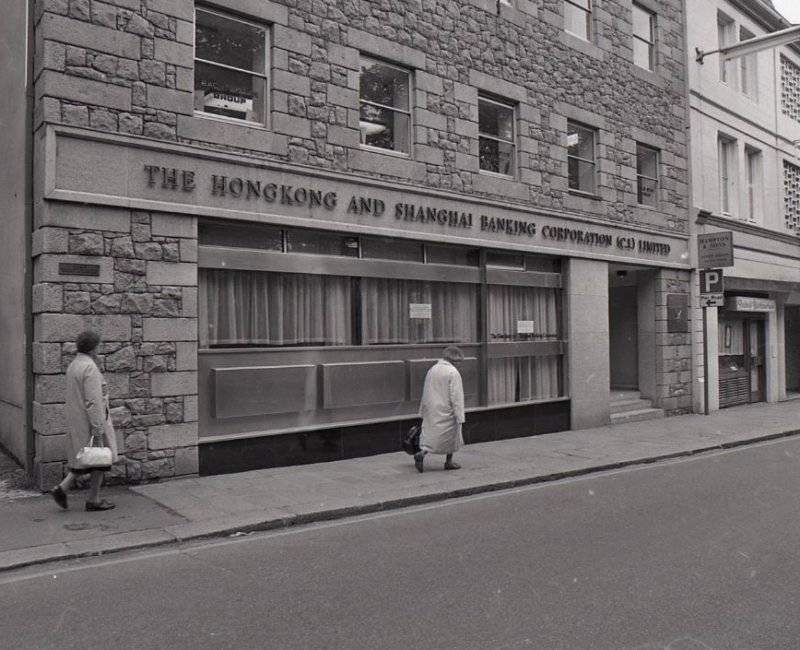Agenda
Key Dates







Image: Courtesy of Jersey Heritage
1961 – Banks began to establish offshore operations in earnest to meet the growing demands of British customers living or working aboard.
1961 – M. Samuel, which later became Hill Samuel, was the first of the merchant banks to arrive in December.
1961 – The Income Tax (Jersey) Law was drafted.
1962 – The States abolish the Code of 1771, whereby the maximum rate of interest chargeable in Jersey was 5% per annum. This led to the arrival of the other major merchant banks.
1967 – Jersey took its first steps in the protection of the interests of depositors with the enactment of regulatory legislation.
1969 – The first American bank opened its doors in Jersey.

Image: Courtesy of Jersey Heritage
1970s – Jersey authorities decided that bank licences should be limited to those in the world’s top 500 banks. Jersey was now home to around 50 banks from the United Kingdom, Europe, North America, South Africa, India and elsewhere.
1971 – Jersey changes to the decimal system.
1972 – Following the United Kingdom joining the European Union, Jersey negotiated a special relationship via Protocol 3, so that the Island remained outside the European Union for most matters.



1997 – In the United Kingdom, Labour was elected, and Jack Straw was appointed Home Secretary. One of his first acts was to send Andrew Edwards to carry out a report into the regulation of the finance industries of the Crown Dependencies.
1998 – Jersey’s financial regulator, the Jersey Financial Services Commission, was established.
1998 – The Channel Islands Stock Exchange was first established.



Image: Former Jersey Finance CEO, Geoff Cook, (pictured right) at the opening of the Jersey Finance Hong Kong office in 2009.
2000 – ECOFIN was set up in 2000 to review tax systems in jurisdictions worldwide. At its head was Labour MP Dawn Primorolo. ECOFIN decided that there were several features of Jersey’s tax system that were unfair. They gave Jersey a deadline to comply with rules, doing away with exempt companies, which were the bedrock of the Island’s financial services industry. The deadline for compliance with ECOFIN rules was extended from 18 months to six years, paving the way for the zero-ten tax system.
2001 – Jersey Finance was founded to promote Jersey as an international finance centre globally.
2002 – Jersey entered into political commitment with the OECD Member States to negotiate bilateral tax information exchange agreements.
2002 – Jersey Finance staged and hosted its first conference in London promoting financial services.
2002 – Jersey Finance organised the first official industry visit overseas when it arranged a trip to the Middle East region led by senior Ministers from Jersey’s Government.
2004 – The first ever Chinese company to list on the Alternative Investment Market (AIM) in London did so using a Jersey company as the listing vehicle.
2004 – A streamlined regulatory regime in 2004 was designed to attract increasing levels of alternative investment funds business while maintaining appropriate regulatory standards.
2004 – Jersey, in pursuit of its good neighbour policy, joined with a number of European third countries and other dependent and associated territories of the EU Member States, in lending support to the EU in the implementation of its Taxation of Savings Income Directive.
2009 – Jersey was one of the first international finance centres to be placed on the OECD ‘white list’ as having implemented internationally agreed tax standards
2009 – The new Foundations (Jersey) Law came into force, widening Jersey’s global appeal as a centre for private wealth management.
2009 – Jersey Finance opened an office in Hong Kong and Jersey companies became able to list on the Hong Kong Stock Exchange.

Image: Panel discussion at Jersey Finance’s UK launch of the ‘Jersey’s Value to Britain’ report.
2011 – The official opening of Jersey Finance’s Abu Dhabi office was celebrated at a reception at the British Embassy.
2011 – Jersey Finance celebrated the 50th anniversary of the finance industry with a gala event and series of fundraising events for local charities.
2013 – For the first time, Jersey Finance published research that revealed that Jersey was responsible for £500 billion of inward investment into the United Kingdom and supported around 180,000 jobs. The research, which was conducted in association with Capital Economics, also highlighted Jersey’s economic contribution to the European Union. Other research papers and studies outlining Jersey’s value to the global economy followed.
2014 – Jersey Finance established a ‘launchpad’ presence in Shanghai
2016 – A report from MONEYVAL, the Council of Europe’s committee of experts on the evaluation of anti-money laundering measuring and the financing of terrorism, found Jersey was ‘compliant’ or ‘largely compliant’ with 48 out of 49 Financial Action Task Force (FATF) recommendations, placing it in the top tier of jurisdictions and describing Jersey as ‘a well-established international finance centre, with a mature and sophisticated AML/CFT regime’.
2017 – The Jersey Financial Services Commission announced Jersey Private Funds – a new regulatory framework for private funds – introducing a streamlined set of regulations designed in consultation with the finance industry to enhance Jersey’s competitiveness.
2018 – The States Assembly approved the Charities (Jersey) Law, bolstering Jersey’s reputation for globally focussed philanthropy and as a forward-thinking centre for private wealth management.
2018 – Jersey Finance became the first international finance centre to set up an office in the Dubai International Finance Centre.
2019 – EU Finance Ministers (ECOFIN) confirmed Jersey’s position as a co-operative jurisdiction following an extensive period of assessment.
2019 – The Government of Jersey made a political commitment to align itself with the principles as set out by the EU’s Fifth Anti-Money Laundering Directive and move towards a public register of beneficial ownership for companies.
2019 – Jersey Finance formally opened its office in New York.



Image: Jersey Finance Chief Executive Officer, Joe Moynihan (pictured right), receives the certificate accrediting Jersey Finance as a Living Wage Employer.
2020 – Jersey Finance was awarded a Jersey Good for Business Charter after demonstrating and encouraging a strong and ethical business attitude within the workforce and in its work across the finance industry.
2020 – In the light of the restrictions imposed by the COVID-19 pandemic, Jersey Finance staged its first global webinar series online to highlight the positive and evolving role Jersey plays in global economies.
2020 – Jersey Finance signs up to the Jersey Living Wage; one of the first firms in Jersey’s finance industry to make the commitment to be Living Wage employers.